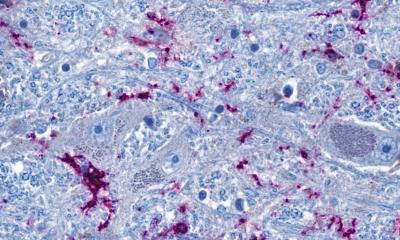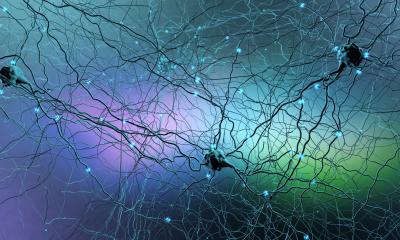Image source: Adobe Stock/Kateryna_Kon
News • Neurological and psychiatric complications
Increased risk of 'brain fog' and other disorders two years after Covid-19 infection
New diagnoses of disorders including psychosis, dementia, seizures and ‘brain fog’ remain commoner two years after Covid-19 than after other respiratory infections, whereas the increased risks of depression and anxiety after Covid-19 are short-lived and there is no overall excess of cases.
Published in The Lancet Psychiatry, the new study from the University of Oxford and the National Institute for Health and Care Research (NIHR) Oxford Health Biomedical Research Centre investigated neurological and psychiatric diagnoses in over 1.25 million people following diagnosed Covid-19 infection, using data from the US-based TriNetX electronic health record network.
The study reports on 14 neurological and psychiatric diagnoses over a 2-year period and compares their frequency with a matched group of people recovering from other respiratory infections. It also reports data in children and older adults separately, and compares data across three waves of the pandemic. According to the researchers, these are the first robust data addressing these important questions.
It is worrying that some other disorders, such as dementia and seizures, continue to be more likely diagnosed after Covid-19, even two years later
Paul Harrison
Confirming previous studies, many of the disorders are more common after Covid-19. Notably, the increased risk of anxiety and depression subsides within two months of Covid-19 and, over the whole 2-year period, are no more likely to occur than after other respiratory infections. In contrast, diagnoses of many neurological disorders (such as dementia and seizures), as well as psychotic disorders and ‘brain fog’, continue to be made more often after Covid-19 throughout the 2 years.
Results in children (under 18) showed similarities and differences to adults. The likelihood of most diagnoses after Covid-19 was lower than in adults, and they were not at greater risk of anxiety or depression than children who had other respiratory infections. However, like adults, children recovering from Covid-19 were more likely to be diagnosed with some conditions, including seizures and psychotic disorders. More neurological and psychiatric disorders were seen during the delta variant wave than with the prior alpha variant. The omicron wave is associated with similar neurological and psychiatric risks as delta.
The study has several limitations. It is not known how severe, or how long-lasting, the disorders are. Nor is it clear when they began, since problems may be present for some time before a diagnosis is made. Unrecorded cases of Covid-19 and unrecorded vaccinations introduce some uncertainty into the results.
Professor Paul Harrison, Department of Psychiatry, University of Oxford, and Theme Lead, NIHR Oxford Health Biomedical Research Centre, who headed the study, said: ‘It is good news that the excess of depression and anxiety diagnoses after Covid-19 is short-lived, and that it is not observed in children. However, it is worrying that some other disorders, such as dementia and seizures, continue to be more likely diagnosed after Covid-19, even two years later. It also appears that omicron, although less severe in the acute illness, is followed by comparable rates of these diagnoses.’
Dr Max Taquet, NIHR Academic Clinical Fellow, University of Oxford, who led the analyses, said: 'The findings shed new light on the longer-term mental and brain health consequences for people following Covid-19 infection. The results have implications for patients and health services and highlight the need for more research to understand why this happens after Covid-19, and what can be done to prevent these disorders from occurring, or treat them when they do.’
Source: University of Oxford
20.08.2022










